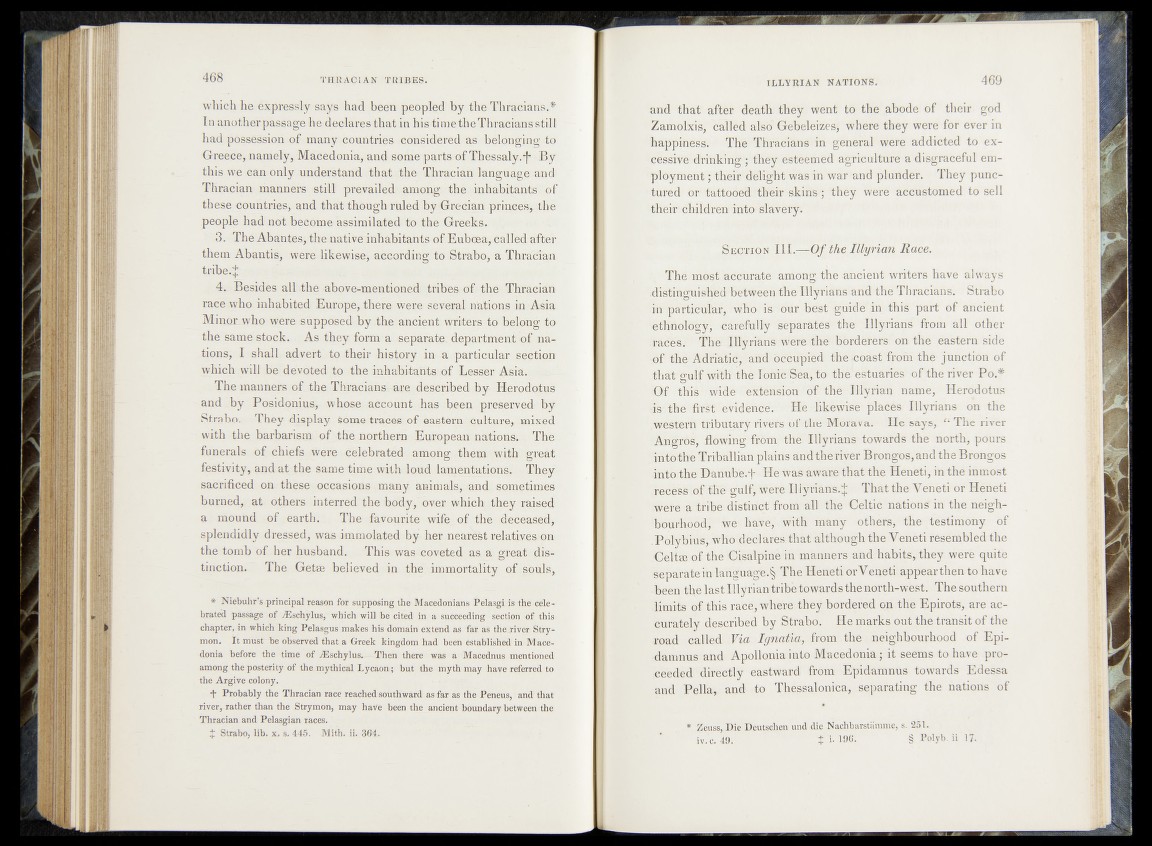
which heèxpressiy says hadbeen peopled by the Thraciahs.*
In another passage he declares that in his-time the Thracians still
had possession of many countries considered as belonging to
Greece, namely, Macedonia, and* some parts of Thessaly.^? - By
this we can only understand that the Thracian language and
Thracian manners still prevailed, among thé inhabitants of
these countries, and that though ruled by Grecian princes, ih$i
people had not become assimilated to the Greeks. ,
3. TheAbantes, the native inhabitants of Enbcea,f.6&lled aflcb
them Abantis, were likewise* according'to Strabo, a ThrdcTan
tribe4
4. Besides all-the above-mentioned tribe»of the . Thracian
race who inhabited Europe, there were sèveml nations,»in/Alia
MinOT-who were supposed by the ancient: writers to'1 belongsto
the same stock. As they form a separate, department of nations,
I shall advert to their history in a p a r t i c u l a r i
which will be: devoted to the in h a b ita n ts^ 'Lessee Asia. •
The manners of the Thracians-age described iby Her^d^jas
and by Posidonius, whose account has-been preserved- by-
Straboi They display Some .traces' ofr èastegni-cultniigs|mixed
with the barbarism o f the northern EijMfM^nsjgioas..« Thd^
funerals of chiefs were celebrated, aanpitgi them withj$||3-eat
festivity, and at the same time with loud lamentations^-' Theyfe
sacrificed on these occasions many animals,bandit sometimes
burned, at others interred the body, over which sthey ^raised
a mound of , earth. The favourite wife of ,the||leQ.eased,
splendidly dressed, was immolated by her nearest relatives on
the tomb of her husband. This Was coveted as a great dis- ...__© ■ —
tinction. The Get® believed in the immortality o f . souls,
* Niebuhr’s principal reason for supposing the Macedonians Pela3giis the celebrated
passage of Aeschylus, which will be cited in a succeeding section of this
chapter, in which king Pelasgus makes his domain extend as far as thej-iver Stry-
mon. I t must be observed that a Greek kingdom had been established in Macedonia
before the time of ASschylus.—Then there was a Macednus mentioned
among the posterity of the mythical Lycaon; but the myth may have referred to
the Argive colony.
+ Probably the Thracian race reached southward as far as the Peneus, and that
river, rather than the Strymon, may have been the ancient boundary between the
Thracian and Pelasgian races.
% Strabo, lib. x, s. 445. -Mith. ii. 364.
469
and that after death they went to the abode of their god
Zamolxis, called also" Gebeleizes^ where they were for ever in
^happiness'; > The Thracians in gênerai were addicted to ex-
cessive drinking ; they esteemed agriculture a disgraceful em-
p l^ th e h t ; their delight was in war and plunder. They punctured
or "tattooed'their skins ; they were accustomed to sell
'their Children into slavery.
I J | j |X ön III WËOf the Illyrian Race.
The mos-fhdcprate; among the ancient writers have always
.distinguished between the Illyrians and the Thracians. Strabo
kr ;pgTt-fehl’ar, ■ who.4is:!oùr bëst%uidë#in this part of ancient
•;fethéologal'.1^arefullyTiseparates' < the Illyrians from all other
The Illyrians'krëifèiHhe bördërers on the eastern side
iof the AdïMid^f^f^ocfeupied thé^oàséCrom the junction of
th à ^M f with théHonic'Bèa, to the estuaries of the river Po.#
•Of this - ■ wïdê^éxtehsion of’the Illyrian name, Herodotus
|îr:thëÆfs^evidence. Hè likewise placés Illyrians on the
tweSterh tributary rivers’©f the Morava. He says, “ The river
Arigrés, flowing from the Illyrians towards the north, pours
jfhtcrthe Trihdllian plains and the river BrongOs, and the Brongos
-into the Danub^f-i He was aware that the Heneti, in the inmost
^fefcissbf 'Ehe gulf, were IHyrians-J That the Veiieti or Heneti
feréfe a tnhbtdistirict from all the Celtic nations? in the neighbourhood,
we- have,- with many others, the testimony of
.Polybius, who declares that although the Venèti resembled the
iCèltæ of-th é ‘Cisalpine in manners and habits, they, were quite
separate in languagfe.Sf The Heneti orVeneti appear then to have
-been tfyp last Illyrian tribe toward s the north-west. The southern
limits of this race, where they bordered on the Epirots, are accurately
described by Strabo. He marks out the transit of the
road called Via Ignatia, from the neighbourhood of Epi-
darnnus and Apollonia into Macedonia ; it seems to have proceeded
directly eastward from Epidamnus towards Edessa
and Pella, and-to Thessalonica, separating the nations of
* Zeuss, Die Deutschen und die Nachberstamme, s. 251.
iv. c. 49. + i. 19G. § Polyb. ii 17-